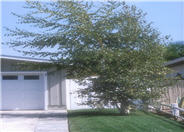
Common name:European White Birch
Botanical name:Betula pendula
This medium-size weeping tree will grow to about 40' tall and has a whitish-brown bark with deciduous green leaves.

Common name:Border or Garden Penstemon
Botanical name:Penstemon hybrids (assorted)
This perennial plant will reach 3' high and has medium-sized, glossy dark green leaves with red, pink, lavender or purple flowers that bloom in summer and fall. It needs a bit extra water in the summer and no water in the winter. Hummingbirds love the flowers. This plant is great for cut flowers and color borders.

Common name:Dwarf Heavenly Bamboo
Botanical name:Nandina domestica 'Nana Compacta'
The ' Nana Compacta' is a small, rounded shrub that grows from 12"-15" high. Its growth habit is dense, and the leaves become bright red in color in cold, winter areas. It can receive sun to part shade, and is used well as an accent plant.

Common name:Ground Cover Rose
Botanical name:Rosa Ground Cover varieties
There are many deciduous, evergreen and semi-deciduous roses that are used as groundcovers, usually reaching 2' in height. They look lovely draping a slope. Rosa groundcovers come in a variety of colors but all need full sun and a moderate amount of water to do well.

Common name:Lily of the Nile
Botanical name:Agapanthus praecox ssp. orientalis
This evergreen shrub will grow about 3' tall and has large green leaves with blue flowers that bloom in spring and summer. It will grow in all soils but prefers loam soil. It can be grown in sun or shade. Lily of the Nile prefers a moderate amount of water; established plants have low water use.
More than half of the water used at your home is for outside purposes. Studies show that on average, half of the water used outdoors is wasted. The leading cause of waste is incorrectly set and poorly managed irrigation controllers. The second biggest cause of wastage is broken irrigation equipment that goes undetected. There are a few basic things you can do to make a big difference in your water use.
Click in the green box for more information
Designer: Wine and Roses
Photographer: GardenSoft
Practice grass-cycling by leaving short grass clippings on lawns after mowing, so that nutrients and organic matter are returned to the soil.
Drip and other smart irrigation delivers water directly to roots, allowing no excess water for weeds.